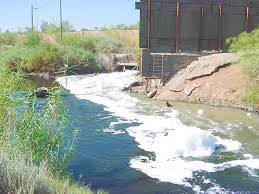Marine Pollution: Life at Sea.

Marine Pollution refers to the pollution occurring due to dumping of waste materials into seas, oceans and other water bodies. The phenomenon of marine pollution occurs when harmful substances enter oceans and chemically harm water bodies and aquatic life. The waste may be industrial waste, agricultural waste or residential waste. Most sources of Marine Pollution are land based. They occur mainly due to non-point sources such as agricultural runoff, wind-blown debris, etc.
What is the effect of dumping waste material into the oceans?
When potentially harmful chemicals are dumped into the ocean, not only does it pollute the water but is a great threat to the aquatic life. We all follow a food cycle, without which the existence of life is incomplete. When harmful chemicals enter the oceans, the indirectly enter our food and then our systems. Let us explain with the help of a simple example: If pesticides enter the oceans (as a non-point source) they are quickly absorbed by the marine food webs. Once in the food webs, these pesticides can cause mutations, as well as diseases, which can be harmful to humans as well as the entire food web.
Pathways of Pollution
Now we have tried to examine the effect of marine pollution and what it is. No we will closely and more carefully look into the different ways that the oceans, rivers and other water bodies get polluted and their impact.
- Direct Discharge: Toxic and hazardous wastes enter into the water bodies through industrial wastes and sewerage. Mining is also considered a reason for contributing to marine pollution. Copper mining generally poses a problem and a threat to aquatic life because they cause changes in patterns of living of coral polyps.
- Land Runoff: This is considered to be one of the most common reasons for marine pollution. The runoff occurs from industrial sites, farming lands, urban lands, etc. Several hazardous and toxic particles accumulate in the sea and enter the food chain.
- Ship Pollution: This is one of the main direct pollution methods by man. Not intentional but they do have a significant impact on marine life. One of the major pollution is through oil spills. Polycyclic aromatic hydrocarbons (PAH) found in crude oil are very difficult to clean up. Oil spills are probably the most emotive of marine pollution events. Invasive species can take over once occupied areas facilitate the spread of new diseases, introduce new genetic material, alter underwater seascapes and jeopardize the ability of native species to obtain food.
- Atmospheric Pollution: Atmospheric pollution is considered as yet another pathway for aquatic or marine pollution. Plastic bags, waste materials, dump, debris and other hazardous substances are blown towards the sea from landfills. This has resulted in the significant decrease in the life of coral reefs and sea animals. The rise in atmospheric temperature is also resulting in the alteration of the temperature of sea water. The rise in the level of carbon dioxide is acidifying the oceans and seas.
- Deep Sea Mining: Deep sea mining is a new process of extracting minerals from the ocean floor. Ocean mining sites are usually around large areas of polymetallic nodules or active and extinct hydrothermal vents at about 1,400 – 3,700 meters below the ocean’s surface.[20] The vents create sulfide deposits, which contain precious metals such as silver, gold, copper, manganese, cobalt, and zinc. The deposits are mined using either hydraulic pumps or bucket systems that take ore to the surface to be processed. As with all mining operations, deep sea mining raises questions about environmental damages to the surrounding areas .
These were the different pathways through which pollutants; toxic and hazardous substances enter into the oceans and seas and not only affect marine life but also our life. We must realise the ecosystem is an interdependent balance of us. We all exist in co-existence and if we harm nature and her ways she will harm us back.
After the pathways let us throw some light into the types of Marine Pollution:
o Acidification: Acidification occurs because the rise in level of carbon dioxide in the atmosphere is taken in by the water bodies thereby making them more acidic. This results in the dissolving or dissolution of calcium carbonate containing substances thereby endangering coral reefs and cause the incapability of sea fishes to create shells.
o Eutrophication: Eutrophication has been defined as the increase in chemical nutrients in water bodies especially compounds containing nitrogen and phosphorous. These substances reduce the amount of oxygen in the water bodies and affect the pools of fishes and other aquatic creatures.
o Plastic Debris: The main form of pollution is the rubbish that is floating in the surface of the water discarded by humans. Plastic wrappers, cloth, paper, etc., are some of the most found waste products found in the sea.
These were some of the main types of marine pollution that take place. It is important that we take care of our ecosystem and follow green living. As earlier stated we are highly interdependent on each other and causing harm to one part of the ecosystem will only further cause damage to ourselves. Take the extra effort, be careful and strive for a healthy environment.

Leave a Reply